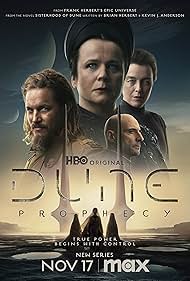Dune: Prophecy 2024– 10Bit.DUAL.H New Episode Download Torrent
This series uses material from the Great Dune School trilogy by Brian Herbert and Kevin J
Plot
Two Harkonnen sisters battle forces that threaten the future of humanity and found a fabled sect that would become known as the Bene Gesserit. Whether they’re exploring the stars, escaping dystopias, or making the world a better place, these women are science fiction. is about… Anderson. The original Dune prologue tells the story of how Rossak’s sister evolved into the Bene Gesserit. The incident with Valya Harkonnen using the voice is from one called “Mentats of Dune.” The development of the Sisters, Mentats, Navigators, and Suk Doctors intertwines throughout all three books.
Referenced in AniMat’s Crazy Cartoon Cast: The New Normal (2020)
Let’s get this straight: a backlash over perceived “DEI politics”; this series is not only frustrating, but fundamentally flawed. Anyone familiar with Frank Herbert’s Dune universe knows that women, and especially the sister, have always been central to the story. This isn’t some modern “rewrite” to appease audiences—it’s embedded in the very DNA of the story. To complain about women in power here is like blaming sand for showing up in the desert. If that makes you uncomfortable, it’s worth considering why that might be. That said, let’s focus on what matters: the series itself.
Visually, it’s stunning
The art direction pays homage to the bold aesthetic established in Denis Villeneuve’s films, creating a seamless visual connection to the wider Dune universe. The scope feels ambitious yet intimate, balancing grand, wide shots with more personal, tightly framed moments. Sure, the CGI sometimes shows its budget limitations, but the overall design is so sharp and thoughtful that it hardly matters. It’s not perfect, but it’s close enough to feel engaging. The writing, while not as philosophically dense as the main Dune saga, respects the audience’s intelligence. It doesn’t oversimplify or diminish the complexity of Herbert’s world to please newcomers.
a different dimension of the sprawling Dune universe
Instead, it relies on the power dynamics and political intrigue that make Sisterhood so fascinating. It’s a cerebral, slow-burning narrative that rewards attention without ever feeling overly indulgent. The final 20 minutes of the first episode, in particular, build tension and payoff that best captures the spirit of Dune, which is gripping and quietly monumental. What sets this series apart is how it explores the Sisterhood. The political machinations here are more front and center, offering a fresh perspective on the currents of power that often drive the larger narrative. It has early Game of Thrones overtones, but a distinctly Dune sensibility: less frivolous, more thoughtful, and more closely connected to the philosophical questions that define Herbert’s work.
Trust me, the effort is worth it
The cast is a compelling mix of seasoned performers and rising stars, with a few standout performances that hint at bigger things to come. As for the adaptation itself, it’s clear that the creators have taken great care not to compromise the integrity of Herbert’s vision. This isn’t a watered-down reimagining—it’s a serious, ambitious continuation of the world he created. Granted, the dense story and shadowy politics may seem daunting to newcomers, but for fans of the books or Villeneuve’s films, that’s part of the appeal. For those already invested in Dune, this series feels like a meaningful expansion—a chance to delve deeper into the nuances of Herbert’s universe. If you’re new, this is a worthy entry point, although you may have to put in some effort to keep up.




 30/48
30/48